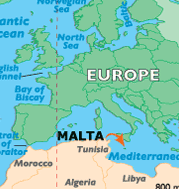 The people of Malta will soon have a choice between a cable broadband provider offering 250/20Mbps service or a fiber to the home network now under construction that will be capable of delivering gigabit broadband across the island — all without usage limits or speed throttles.
The people of Malta will soon have a choice between a cable broadband provider offering 250/20Mbps service or a fiber to the home network now under construction that will be capable of delivering gigabit broadband across the island — all without usage limits or speed throttles.
Starting this month, for €96 per month ($128), customers of Melita can buy a triple play package of phone, broadband, and cable television that includes a free upgrade to 250/20Mbps.
“The FibrePower 250 product leverages the investments Melita has made in the past years and further strengthens the company’s position as Malta’s fastest service provider,” said Michael Darmanin, director of marketing and corporate services at Melita. “We are seeing an exponential growth in demand for higher speeds and capacity. This is driven by more people connected in the same household or business, more devices and more consumption of video over the Internet.”
Darmanin added the Maltese people want fast and unlimited broadband service, and they will deliver it, starting at Tigne Point (Midi) and Fort Cambridge in Sliema. The service will then gradually be rolled out in other Maltese communities.
Malta, in the Mediterranean Sea, has a population of around 450,000. The country has two major telecom companies: Melita which delivers cable service and GO, which delivers DSL service over the telephone network. Vodafone used to offer a now-discontinued WiMAX service across the island, which never had a significant market share.
 The Maltese government made broadband expansion a national priority and set regulatory policies that would increase competition. But the government also insisted that telecom market improvements also benefit customers, and the country laid the foundation of its broadband policy on encouraging the development of a nationwide fiber to the home network.
The Maltese government made broadband expansion a national priority and set regulatory policies that would increase competition. But the government also insisted that telecom market improvements also benefit customers, and the country laid the foundation of its broadband policy on encouraging the development of a nationwide fiber to the home network.
The tradeoff: the government would deregulate the broadband marketplace and remove regulatory obstacles and unnecessary red tape governing pole usage and underground trenching, but in return providers must meet government objectives towards enhancing broadband speeds and price competition.
 As a result, Melita has aggressively invested in cable broadband upgrades that have delivered broadband speeds faster than what most Americans and Canadians can buy from their cable providers. The cable operator plans to be among the earliest adopters of DOCSIS 3.1 which will support up to 10/1Gbps broadband speeds.
As a result, Melita has aggressively invested in cable broadband upgrades that have delivered broadband speeds faster than what most Americans and Canadians can buy from their cable providers. The cable operator plans to be among the earliest adopters of DOCSIS 3.1 which will support up to 10/1Gbps broadband speeds.
Not to be outdone, GO is rolling out its own fiber to the home network supporting interactive IPTV and faster broadband speeds. It will then be able to retire its DSL service, which now provides respectable Internet speeds up to 35Mbps.


 Subscribe
Subscribe Israel has decided its broadband future can no longer lie in the hands of one phone and one cable company, so the country is commissioning a nationwide fiber to the home broadband network that will be run as a public-private partnership, eventually reaching every home and business in the country.
Israel has decided its broadband future can no longer lie in the hands of one phone and one cable company, so the country is commissioning a nationwide fiber to the home broadband network that will be run as a public-private partnership, eventually reaching every home and business in the country. Current consumer broadband speeds in Israel top out at around 100Mbps, but at a price. Broadband is still costly in Israel and most customers choose packages comparable to what Americans receive — 10-15Mbps service.
Current consumer broadband speeds in Israel top out at around 100Mbps, but at a price. Broadband is still costly in Israel and most customers choose packages comparable to what Americans receive — 10-15Mbps service. Only 12% of Dutch consumers do not already receive 50Mbps broadband service. They will have it within two years according to Dutch telecom observers.
Only 12% of Dutch consumers do not already receive 50Mbps broadband service. They will have it within two years according to Dutch telecom observers.

 More than a year ago, Comcast
More than a year ago, Comcast  But if Comcast brings back the cap, Cox will downgrade his service back to where he started.
But if Comcast brings back the cap, Cox will downgrade his service back to where he started.